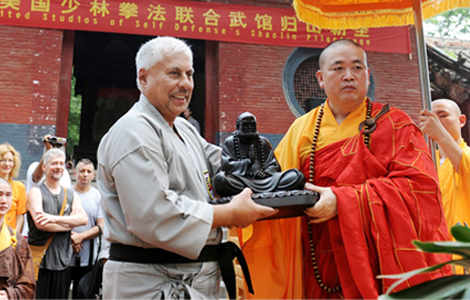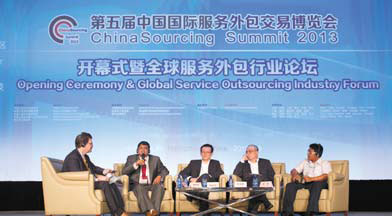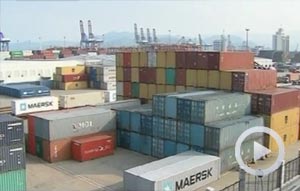ChinaSourcing Summit: Bigger no longer better
Updated: 2013-07-05 07:05
By Jordyn Reiland in Hangzhou, Zhejiang (China Daily)
|
||||||||
|
Company executives brainstorm at an industry forum. |
As the outsourcing market in China rapidly evolves, offering the lowest cost is no longer the best way to succeed, said several experts at the 2013 ChinaSourcing Summit.
Welcoming members of government, about 200 buyers and a host of service providers, the summit now in its fifth year continues through today with seminars and opportunities for negotiations between service providers and buyers.
This year's summit has the theme of innovation, application and integration, topics highlighted during several discussions.
Executives from four companies gathered for a panel discussion Wednesday on those subjects moderated by Jamie Popkin, managing vice-president of Gartner, a US IT research and advisory firm.
Representatives of the companies agreed that the Chinese market can no longer rely on merely providing cheap labor, but each had different ideas of what would bring future success.
Chen Haixiao, head of operations for the China Delivery Center at CI&T, said the idea of companies merging and growing has remained a hot topic over the last several years, but the discussions need to change.
"Outsourcing in reality has become a commodity business, so if we just follow that, what we have is a pricing war," he said. "You are getting bigger but the profit margin is getting lower.
"Maybe if you are getting bigger you can compete, but it's not catching up - just following," he said. "You cannot even survive in the long run if you are just following the big wheel because you don't have the competitive edge."
The way to succeed in business now is to provide a premium service to stand out to potential buyers, he noted.
"Basically we want to be the Rolex. Instead of just selling a watch, we're selling jewelry."
Shang-Ling Jui, executive vice-president and chief technology officer at Pactera, said that linear growth and expansion for a company might have been the way to succeed 10 years ago, but it is not the answer now.
Chen said it is not only an issue for Chinese companies, but also those in other countries such as Brazil.
Rangarajan Vellamore, CEO of Infosys China, agreed.
"I think the most important thing that we look at is the right value for the customer," he said.
Xia Wei, senior vice-president of Wuhan BJC Technology, cited the takeover of Longtop Financial Technologies in 2011 to illustrate the strength of corporate culture and his goals for the changing market.
None of former Longtop middle management left their jobs after the merger and the staff turnover rate was 5 to 7 percent in first six months following the deal, a rate far lower than the industry average, Xia said.
He attributed the retention to efforts in building the company's corporate culture, adding that BJC treats each employee equally and kept former LFT operational procedures intact to ease the transition. It also maps out career development for employees to promote a sense of belonging and is planning a housing subsidy to retain staff.
While telecoms currently contribute more than half of the company's business, BJC plans to compete further up the industrial chain, he said.
"Cloud computing, big data and mobile Internet are all where our opportunities lie, but from our company's perspective, we'll take the mobile Internet as a strategic position - that is where we put our stake," he said.
Wang Wendi contributed to this story.
(China Daily USA 07/05/2013 page14)

 Chinese fleet arrives in Vladivostok for drills
Chinese fleet arrives in Vladivostok for drills
 Joey Chestnut wins 7th contest with 69 dogs
Joey Chestnut wins 7th contest with 69 dogs
 Lisicki, Bartoli to vie for new Wimbledon crown
Lisicki, Bartoli to vie for new Wimbledon crown
 Muscle Beach Independence Day
Muscle Beach Independence Day
 Tough workout for Li Na in war of words
Tough workout for Li Na in war of words
 Submersible taps mineral deposits in S China Sea
Submersible taps mineral deposits in S China Sea
 Ecuador finds spy mic for Assange meeting
Ecuador finds spy mic for Assange meeting
 US martial artists arrive at Shaolin Temple
US martial artists arrive at Shaolin Temple
Most Viewed
Editor's Picks

|

|

|

|

|

|
Today's Top News
Mandela on life support, faces 'impending death'
Missouri govt's veto won't stop Smithfield deal
ROK to discuss Kaesong normalization with DPRK
Gunman shoots two, commits suicide in Texas
Baby formula probe to shake or reshape industry?
Passenger detained over bomb hoax in NE China
High rent to bite foreign firms in China
Egypt's prosecution imposes travel ban on Morsi
US Weekly

|

|







